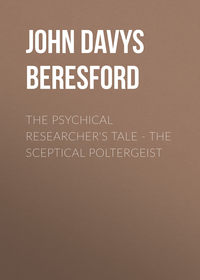Loe raamatut: «The Psychical Researcher's Tale - The Sceptical Poltergeist»
The Psychical Researcher's Tale - The Sceptical Poltergeist
From "The New Decameron"—Volume III
There was once a time (he began) when I decided that I was a fraud; that I could not be a psychical researcher any longer. I determined to give it all up, to investigate no more phenomena nor attend another séance, nor read a word about psychical research for the remainder of my life. On the contrary, I planned an intensive study of the works of the later Victorians, of that blissful period in the history of Europe when we could believe in the comforting doctrine of materialism. "Oh!" I thought, "that one had a Haeckel or a Huxley living now to console us with their beautiful faith in the mortality of the soul!" The Neo-Darwinians failed to convince me; the works of H. G. Wells left me cold.
I will tell you the events that brought me to this evil pass.
It is not likely that anyone here will remember the Slipperton case. It attracted little attention at the time. In 1905 there was still a little sanity left in the world. A few even of the London dailies were nearly sane then, and refused to report ghost stories unless they were known to be untrue. And the Slipperton case had hardly any publicity—an inch in the Daily Mail, headed "Family Evicted by Ghosts," was the only newspaper report that I saw; though there may have been others. In these days the story would be given a couple of columns opposite the leader page; and the Sunday papers...
I was connected with the thing because Edgar Slipperton and his wife were friends of mine; quiet, old-fashioned people who believed that when you were dead you were dead, and that that was the end of it.
The phenomena that drove them out of their house at last were of the ordinary poltergeist type that date back to the days of John Wesley. The Slippertons had a fat and very stupid cook, whom I suspected of being an unconscious medium; but they were so attached to her that they refused to give her notice, as I strongly advised them to do. They told me that although she was constitutionally unable to grasp a new idea, such as the idea of a different pudding, she was entirely dependable, always doing the same things in the same way and with the same results. And while this confirmed my suspicions that she was a spiritualistic medium, I recognised that she might have useful qualities as a cook.
The Slippertons stood it pretty well for a time. At first they were only mildly inconvenienced. Things used to disappear mysteriously, and turn up in unexpected places. Slipperton's pince-nez, for example, were lost, and found inside the piano. And Mrs. Slipperton's "false front" would be moved in the night from the dressing-table to the brass knob of the bed-post, even after she took to pinning it to the toilet cover. Things like that; irritating, but not really serious.
But the trouble increased, grew to be beyond endurance in the end. The poltergeists, with that lack of imagination which always characterises them, started to play the old trick of pulling off the Slippertons' bed-clothes in the middle of the night—one of the most annoying of the spirits' antics. And they followed that by experimenting with the heavy furniture.
I was out of England when the trouble came to a head, and I heard nothing of the later developments until after the Slippertons had left the house. I happened to meet Slipperton by accident in the Haymarket, and he took me into his club and gave me the whole story. Naturally, I was glad of the chance to investigate, although I thought it very probable that the phenomena would cease with the departure of the cook. I determined, however, to go down and spend a week in the house, alone. I was not dismayed by the fact that I should be unable to get any help with my domestic arrangements, owing to the superstitious fears of the villagers. I rather enjoyed cooking my own meals in those days.
It was fine weather in late May when I went down, and I regarded the visit as a kind of holiday rather than as a serious investigation. Nevertheless, from force of habit I carried out my inquiry in the scientific spirit that is so absolutely essential in these matters. The Slippertons' house was on the outskirts of a small town in Buckinghamshire. The shell of the house dated from the early seventeenth century. (You will find it described in the Inventory of the Royal Commission on Historical Monuments—the second volume of the Buckinghamshire survey.) But the inside had been gutted and replanned to suit our modern requirements, such as the need for making each bedroom accessible without passing through other bedrooms, the necessity for a fitted bathroom, and so on.
